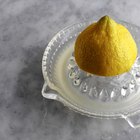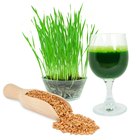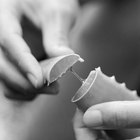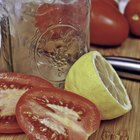Juicing fresh fruits and even vegetables is a tasty, efficient way to get a dose of thirst-quenching nutrition, but most fresh fruit juices are highly perishable. Plan to use them within a few days and let your nose guide you. If a juice smells bad, it probably is bad.
Fresh Juice Shelf-Life
Whether you're making fresh orange or carrot-kale juice, err on the side of caution and use homemade juices within 24 hours. Some juices, such as orange juice, may separate during storage. Shake the juice to restore it. All fresh, homemade juices must be refrigerated at 40 degrees Fahrenheit to keep them safe and fresh.
Keeping It Safe
Occasionally, fresh juices may contain food pathogens, such as the E. coli or salmonella bacteria. Even a microscopic amount of these pathogens can cause serious illness or even death, particularly among young children, the elderly and those with compromised immune systems. Use only fresh, unblemished fruit and wash it well before juicing it. Cut out any soft or bruised areas, which tend to spoil quickly. If young children, the elderly or others at risk for serious foodborne illness will drink the juice, heat it first to 160 F to pasteurize it and kill any bacteria. Refrigerate homemade juice promptly.
The Nose Knows
Refrigerating homemade juice and using it promptly is the best guarantee of freshness, but you can gauge the quality of the juice just by using your senses. As juice begins to spoil, it takes on a sour odor and taste. Discard any juice that smells or tastes like alcohol, yeast or mold. If you see mold, discard the juice, as well.
Making It Last
It's also possible to preserve homemade juices for longer storage. Freeze homemade juice in plastic freezer boxes, leaving 1 1/2 inch of headspace at the top to allow for expansion. Most homemade juices, including apple juice, grape juice, tomato juice and orange juice, can be canned using a pressure canner or hot water bath canner. Use only sterilized equipment and jars and follow all directions carefully. When processed properly, frozen juice can be stored for up to three months, while canned juice can be kept for up to one year. Always follow canning directions exactly to ensure a safe product. If you're using low-acid fruits, such as plums, or most vegetables, you may have to add vinegar or lemon juice or process the juice in a pressure canner.
Related Articles

How to Keep Cucumber Juice Fresh

Fresh Homemade Orange Juice Will Stay ...

How Long Does Tomato Juice Last After ...

What Is the Freezing Point of Fruit ...

How to Make Chocolate Juice
How to Tell If Fresh Tomato Juice Is ...
How Long Can You Refrigerate Fresh ...

Can Beet Juice Sit Out Overnight?
How to Preserve Blackberry Juice in ...

How to Use Wheatgrass for Washing Hair

The Disadvantages of Juicing
Does Lemon Juice Go Bad If Not ...

How Long Will Pineapple Juice Stay Good ...

How to Tell When Orange Juice Has ...

How Long Does Aloe Vera Juice Last in ...

How to Make Tomato Juice From Fresh ...

Where to Buy Pomegranate Juice

What Juices Tenderize Steak?

How to Juice Kohlrabi

What Juices Are Good for Healing Acne ...
References
- Colorado State University Extension: Food Safety and Homemade Juices
- U.S. Food and Drug Administration: Raw Produce: Selecting and Serving It Safely
- Eat By Date: How Long Does Fruit Juice Last?
- Utah State University Extension: Canned Goods
- USDA Complete Guide to Home Canning and Preserving; U.S. Department of Agriculture
Writer Bio
Julie Christensen is a food writer, caterer, and mom-chef. She's the creator of MarmaladeMom.org, dedicated to family fun and delicious food, and released a book titled "More Than Pot Roast: Fast, Fresh Slow Cooker Recipes."